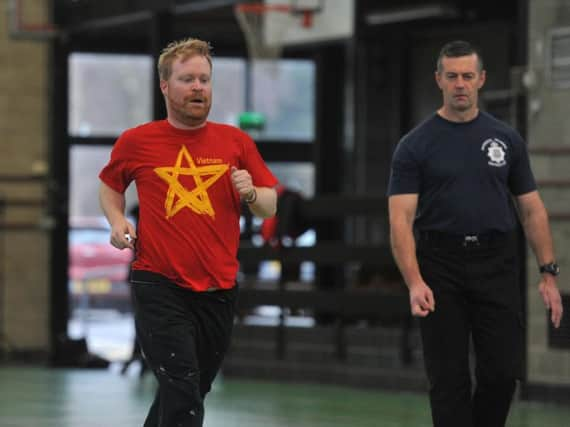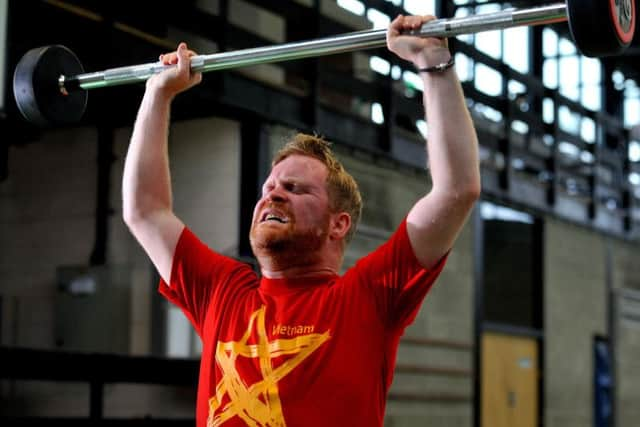Could you pass the police fitness test?


“UK cops too unfit to walk the beat,” one screams.
“Blobby Bobbies” says another.
Police fitness has never been under greater scrutiny.


In March last year reports claimed overweight officers faced the boot if they failed basic tests of their abilities.
But just how fit do you have to be to walk the streets as one of Lancashire’s finest?
Advertisement
Hide AdAdvertisement
Hide AdOne man who knows is physical training instructor PC Paul De Wilde.
Based at the force’s headquarters in Hutton he’s one of the men charged with getting and keeping the boys in blue in shape.


And, as it turns out, there are strict standards.
As a 37-year-old father of three, former smoker, couch potato and self-appointed pie officianado (not to mention The Gazette’s official biscuit correspondent) agreeing to be put through my paces may not have been the wisest idea.
And Paul very quickly makes clear he won’t be going easy on me as he demonstrates just what is needed to be cleared to step out on patrol.
Advertisement
Hide AdAdvertisement
Hide AdThe first thing that is made clear is there is not one fitness standard.
“There is a basic level, one we need every recruit to meet,” explains Paul.
“But beyond that you’ve got different levels based on the role, the specialism you might want to take.
“To be a riot officer you need to have a higher level of fitness, the same again for a firearms officer.
Advertisement
Hide AdAdvertisement
Hide Ad“Dog handlers, mounted officers, again there are different, higher standards.”
The test is simple, run a 15m course, between two cones in time to a bleep.
It’s a standard in many fitness fields, one I’ve seen professional footballers put through and punished by in pre-season.
The minimum standard, it is explained, is to reach level five and manage four legs.
Advertisement
Hide AdAdvertisement
Hide AdAnything beyond that and it’s a case of seeing how high up the pyramid a middle-aged man might push.
In fairness Paul, an experienced instructor, knows there’s no use in shouting at me and his gentle encouragement seems to be doing the trick as I breeze through the first two sections.
It’s only then Paul points out that was just the warm up.
Trying hard to hide my disappointment at effort wasted there is time for a final few stretching exercises before lining up for real.
Anyone who has done a bleep test will know how quickly the pace can pick up and having initially been well ahead of the clock, it’s soon clear how close I’m cutting it on each leg.
And still things get faster.
Advertisement
Hide AdAdvertisement
Hide AdOnto level five the turns are getting shorter, fractions of a second.
And even when the minimum level is reached there’s no time for celebration.
“Let’s see how far you can get,” shouts Paul.
It barely registers, the only focus on beating the bleep.
Level six, that’s good enough to be part of the Police Air Service.
“One more and that’s a response officer,” comes the call.
I push on, reaching the line.
But the test has taken its toll, there’s a wobble in my left calf and I decide it’s time to stop before I do myself any harm.
Advertisement
Hide AdAdvertisement
Hide AdFor a moment I’m impressed but Paul’s quick to bring me back to earth.
“You’ve made the basic standard, what we’d expect of a recruit,” he explains.
“But where you’ve got to, that level on the test, we’d expect officers at that level to perform the test carrying all their kit, in full uniform.
“That makes it tougher and it’s a level we expect them to maintain.
“In training it’s a level the need to attain all the time.”
Advertisement
Hide AdAdvertisement
Hide AdProving, as a one off, you have what it takes to join the force is very different to the day-to-day reality of training and life on the beat where that fitness level might be called into question at any point.
Officers are regularly tested and the level is far from basic.
I’ve managed barely four minutes on the test.
Officers at the peak of fitness might manage seven or more.
And, despite my decision not to make any flippant remarks about coffee or donuts, Paul is keen to show how officers and other police staff are kept in shape.
He runs regular boot camp sessions in the Hutton gym and has set up a special circuit.
It might all be familiar business to gym-goers.
Advertisement
Hide AdAdvertisement
Hide AdBut to a man whose greatest sporting achievement is finishing 96th in the Northern School’s Cross County Championships (1995) it’s a real test.
Having breezed through the ‘wall ball’ exercise I hit the bricks in spectacular fashion with tuck jumps, 15 of which nearly floor me.
With my chest burning I’m ready to quit.
But Paul can see the pain and he wants me to push on... to the weights.
Each of the 15 lifts feels a punishment, even more so when Paul points out the force press officer who is watching on does this kind of thing every week, once she’s finished a three mile jog.
Advertisement
Hide AdAdvertisement
Hide AdWith burpees - a squat thrust come push up to the uninitiated - still to go even the toughest of police instructors can see I’m spent, ready to collapse on a handy pile of gym mats.
Muscles aching, it’s a chance to reflect on the fitness levels needed.
A man can walk off the street with no training or preparation and reach the basic standard.
But to match that level day in and day out, as the force expects, is not easy.
Advertisement
Hide AdAdvertisement
Hide AdIt’s something Paul knows: “People do fail the tests,” he said. “But we’re here to make sure they hit the standard.
“It can be tough but the standards, for every different role, are there for very important reasons.”